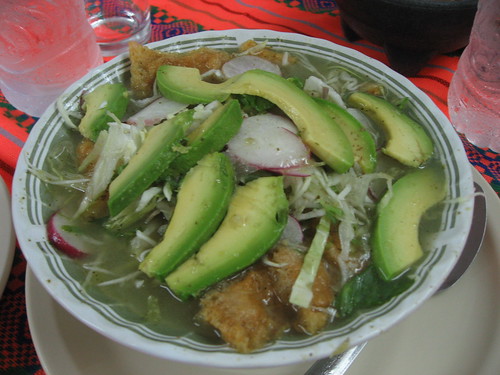Authentic: it's a loaded gun when it comes to food. Especially when referencing food that comes from another culture. So I give props to Michael Bauer, food critic for the San Francisco Chronicle, for how he handles the question, What is authentic?, in a recent blog post. The post came in response to a reader challenging the idea that certain restaurants in the Bay Area hailed by Bauer served authentic pozole.
In the months that I spent researching culinary tourists' notion of authenticity in online reviews, a lot of people asked what I meant by "authenticity."
No, no, I said to them. The question is, what do THEY (the reviewers) mean by authenticity?
Ah yes, you know you're in the social sciences when you refuse to make definitive claims about your own views, but instead refer to other people's opinions. You also know that you're in the social sciences when you say, "X is a social construction."
Well, this is what I have to say about authenticity: it's a social construction.
That is, authenticity means different things to different people, and often in different contexts. What is and isn't authentic to any given individual is fluid, rarely conforms to any standardized schema, and often has as much to do with one's audience as with one's own opinions. To muddle things even more, some scholars propose the concept of an experience being authentic to oneself, lending to a certain sense of self-realization, even if the experience or object of consumption is not thought of as "authentic" (for you nerds out there, object-related authenticity vs. existential authenticity).
As for Michael Bauer, he thinks that,
When people say something isn’t authentic, it’s generally to set themselves up as experts. What they’re really saying, in most cases, is that a dish is not like the one they had when they traveled in Mexico, Italy, India or whatever region is under discussion...In the context of social construction, I find authenticity fascinating. What people do and don't think of as authentic says a lot about them and how they see the world. The marketing of "authenticity" also plays an integral role in destination branding, creating a sense of limited resources (e.g., one can only get authentic posole in Mexico vs. authenticity as socially constructed whenever and wherever one wants).
There are as many recipes for posole as there are cooks, so what makes one more “authentic” than the other? I think most times the one we deem as “authentic” is the one that is most familiar or appeals to us.
When it comes to food, though, my overarching question is, is it tasty? Michael Bauer and I sometimes disagree on what restaurants serve tasty food. But we do seem to agree that the question of authenticity is more about the who rather than the what.

Ha! One of our writers wrote a review for a restaurant today that cited both its "authenticity" and the price. I thought of you, of course.
ReplyDelete